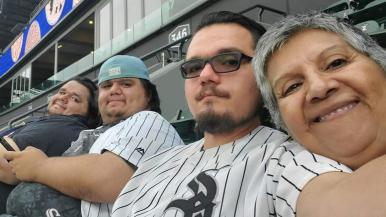When she was 50 years old, Beatrice Karnoscak’s first mammogram detected breast cancer. Ten years after finishing treatment, Beatrice was diagnosed with lung cancer. Each time, early screening is what saved her life.
Early detection is essential: More than 70% of women who die of breast cancer didn’t have mammograms in the years leading up to a diagnosis.
“A lot of breast cancer cases detected by mammography have a great prognosis,” says Lydia Usha, MD, a medical oncologist at RUSH MD Anderson Cancer Center, who started treating Beatrice when she was in remission from her breast cancer diagnosis. “Most women do well with screen-detected breast cancers, survive it and have a normal life expectancy. These breast cancers usually require less therapy than more advanced cancers caught later.”
Early-stage lung cancer
As a person with a history of smoking and COPD, Beatrice was already enrolled in Rush’s lung cancer screening program. In April, a screening found cancer.
“When I answered the phone and heard my doctor’s voice, I knew it wasn’t good,” Beatrice says. “She explained what they found was suspicious, and then sent me to go see a pulmonologist, who agreed with the early-stage lung cancer diagnosis. From there I was connected with Dr. Alex.”
Gillian Alex, MD, a thoracic surgeon at RUSH MD Anderson, performed the surgery that removed Beatrice’s cancer. She was able to remove the nodule and save most of the affected part of her lung. Because the cancer was detected early, Beatrice didn’t need any additional treatment outside of surgery.
“Lung cancer screenings are so important,” Alex says. “It’s an incredibly effective screening tool. The earlier we diagnose you, the more likely you are to survive.”
More than medical
For Beatrice, making sure she keeps up with her screenings is more than a medical decision — it’s a personal one. Her best friend died of late-stage cancer in 2019.
“She was like how I used to be — putting off screenings. After what I went through, I told her she had to go in. She thought I was being hypervigilant. But I’m still here, and she’s not,” Beatrice says. “I tell my sons all the time that they need to be checked, too.”
Beatrice has no evidence of the disease once again. But she’s not taking that for granted. She continues to see Usha every six months, alternating between getting an MRI and mammogram for continued breast cancer screening.
Beatrice is now making it her mission to get people in for their screenings — both when they’re due and when something feels off. She says it’s a matter of having agency of your life and your health and believing that things can work out in your favor.
“You can’t say ‘there’s no hope.’ There’s always hope.”




